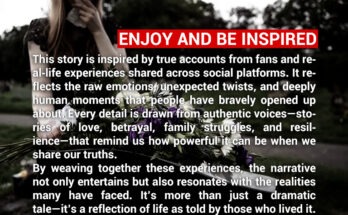I’m Liz, 25, and I’ve always believed love after divorce can be real—just different. My parents split when I was 15, and while it wasn’t explosive, it left a quiet ache. Mom raised me and my brother Sam with grace, never badmouthing Dad. She carried the weight of our family with dignity, and I didn’t fully appreciate it until I saw how other families fell apart. Dad moved out, and holidays became split screens of awkward smiles. Still, we found a rhythm. Years later, Dad met Amanda, and for the first time in ages, he looked genuinely happy.
Amanda was younger, polished, and eager to impress. I wanted to like her—for Dad’s sake—but her subtle digs at Mom made it hard. She’d joke about being “the upgrade,” comparing her cooking to Mom’s casseroles. Dad always shut it down, insisting Mom deserved respect. But Amanda’s insecurity seeped through her laughter. Sam and I noticed it, and it made us uneasy. Still, Dad seemed lighter, more alive. When he announced their engagement, I congratulated him, even though my gut twisted. I wanted him to be happy, but something about Amanda felt off—like she was performing love, not living it.
The engagement dinner was meant to unite both sides of the family. Amanda went all out—candles, folded napkins, a curated menu. She greeted me with a rehearsed hug and complimented my looks like she was checking a box. For a while, everything felt normal. My grandparents smiled, Sam cracked jokes, and Amanda basked in the praise. Then my grandmother gently said, “David, I’m glad you found happiness again, like you once had with Laura.” Amanda’s face twitched. She laughed—loud, sharp—and said, “Laura must’ve been a terrible wife if I’m the upgrade.” The room froze. Dad’s face went pale.
Sam exploded. His chair screeched back, wine spilled, and his voice thundered: “Don’t you dare talk about our mom like that.” Amanda tried to laugh it off, calling it a joke, but no one was buying it. I couldn’t breathe. I walked out, heart pounding. From the hallway, I heard Dad’s voice—steady, furious: “I will never marry someone who insults the mother of my children.” Amanda begged, pleaded, tried to twist it, but Dad didn’t flinch. “Our future ends here,” he said. The door slammed. Amanda was gone. The silence that followed felt like a storm had passed.
Back in the kitchen, Dad pulled out chocolate cake and asked, “Tea?” It was the most ordinary question, yet it carried the weight of everything. We sat quietly, sipping tea, eating cake, letting the silence settle. Then Dad spoke: “No matter what happened between your mom and me, I promised I’d always respect her. She gave me two amazing kids and held everything together when I couldn’t.” His voice cracked, but his eyes were clear. Amanda never understood that respect isn’t optional—it’s the foundation. And if she couldn’t honor that, she didn’t belong in our lives.
Amanda sent texts the next morning—apologies, excuses, accusations. Dad read a few, rolled his eyes, and blocked her. A week later, the engagement was officially over. Sam and I visited Mom and told her everything. She listened quietly, her face calm. When we shared Amanda’s words and Dad’s reaction, she exhaled deeply. “He did the right thing,” she said. No gloating, just quiet pride. For the first time in years, I saw a smile tug at her lips. She was relieved. And proud. Dad had remembered who he was—and who she was.
Mom suggested ice cream, like old times. We laughed, surprised, but followed her lead. That night, the four of us sat in a booth at the shop we loved as kids. Dad looked tired but lighter. Sam smeared whipped cream on my nose, Mom scolded him playfully, and we laughed like we hadn’t in years. Divorce still existed. Grief still lingered. But our family bent without breaking. Dad proved that love after divorce doesn’t mean erasing the past—it means honoring it. And somehow, over sundaes and cones, I felt hope again. Real, warm, sticky-fingered hope.
That dinner could’ve ended in disaster, but instead, it became a turning point. Dad chose respect over romance, integrity over illusion. Amanda’s cruelty revealed her true self, and Dad didn’t hesitate to protect us. That night reminded me that love isn’t just about who you choose—it’s about how you honor those you’ve loved before. Our family isn’t perfect, but it’s resilient. And when Dad stood up for Mom, he stood up for all of us. That’s the kind of love that lasts. That’s the kind of man I’m proud to call my father.


